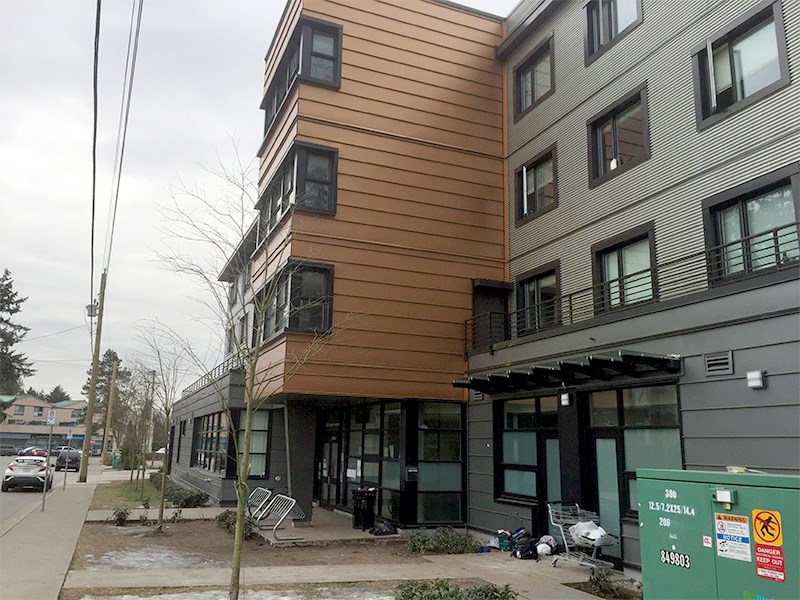The homeless shelter at 3030 Gordon Ave. in Coquitlam opened with the goal of providing a place for people in need of immediate emergency shelter and to those taking the next steps into more permanent housing.
But servicing the two different groups all under one roof has proven to be more challenging than anticipated, according to Coquitlam city staff.
And the problems have discouraged the shelter’s operators from following a similar model for future facilities.
“Trying to manage and provide sufficient supports and services for groups of residents that have very different types of needs is just challenging from an operational point of view,” Andrew Merrill, Coquitlam’s director of development services, said Monday.
One of the main issues has been with people loitering at the front door of the facility.
The problem has been so pervasive that at one point, the 3030 Gordon Task Force considered putting forward a loitering bylaw to the city, shelving the plans after staff noted the most problematic aspects associated with loitering, like trespassing and panhandling, are dealt with through existing provincial legislation.
Merrill said there is little that can be done to redirect people away from the facility given the lack of service, particularly during the day time, for the homeless population.
“Everyone involved… is constrained by the lack of housing and service to refer people to,” said a city staff report. “People can be moved along but there are not places for people to be moved along to.”
Merrill added that BC Housing, which oversees the facility, has acknowledged the difficulties with the current model and have told city staff they are unlikely to take a similar approach at future sites.
That raised concerns from some at the council table, who said the provincial government needs to do more to make the housing facility work in Coquitlam.
Coun. Brent Asmundson said he would like to see 3030 Gordon pick between emergency shelter or transitional housing, noting the building is capable of being retooled to make the transition possible.
“We made a promise to those neighbours [of the shelter] to manage those impacts,” he said. “We haven’t been able to keep that promise to the people in that area.”
He added that he was frustrated to hear that BC Housing does not support the mixed model.
“It is disappointing that they know they would never do this type of things again,” Asmundson said. “They should be coming down and investing to make it work.”
Dominic Flanagan, BC Housing’s executive director of strategic initiatives on homelessness, said having separate buildings for emergency shelters and transitional housing would be preferred. But given that 3030 Gordon is the only permanent facility serving homeless people in the Tri-Cities, BC Housing is trying to do as much as it can with the space it has.
“In a perfect world, we would have more housing options that would allow us to review the model,” he told The Tri-City News Wednesday. “It is a bit of a challenge to review the model when there are no other housing options across the Tri-City area.”
Flanagan added that a similar shelter to 3030 Gordon operates in Langley. Another facility in Abbotsford has the emergency shelter component in one building and the transitional housing piece in another, but the two are located side by side.
COQUITLAM RCMP COMPLAINTS DOWN NEAR SHELTER
While businesses and residents around 3030 Gordon Ave. in Coquitlam have raised concerns about crime associated with the homeless shelter, police say the number of calls to the area has dropped over the last three years.
According to data provided by Coquitlam RCMP, the number of general occurrences — which includes all files that were created to the address and where a report has been written — fell from 547 in 2018 to 407 in 2019. The most common types of call last year was for unspecified assistance, which means there is no identified criminal offence in the complaint. Causing a disturbance was the second most common call, followed by violations of the Trespass Act.
But Cpl. Michael McLaughlin said many of the files were generated by staff or people who live at 3030 Gordon and may not necessarily be from complaints coming from the surrounding neighbourhood.
He also noted that a complaint filed with police does not necessarily mean a crime occurred and that some of the calls in the data provided were deemed unfounded.



